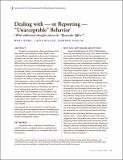Dealing with—or Reporting—‘Unacceptable’ Behavior
Author(s)
Rowe, Mary; Wilcox, Linda; Gadlin, Howard
DownloadArticle (280.7Kb)
Metadata
Show full item recordAbstract
People in organizations often see behavior that they think is unacceptable, unsafe, illegal—even criminal. Why do people who observe such behavior hesitate to act on their own, or to come forward promptly—even when affected by that behavior? Why do they not immediately report those whom they see to be acting in an intolerable fashion?
Hesitation of this kind has been recognized for years; for example, there is a controversial literature about
the “bystander effect.” In real life hesitation is not confined just to bystanders. People in all roles may hesitate to act. Why do some people—including many managers—waver, rather than acting effectively to stop behavior they find to be unacceptable? The most common reasons for hesitation are: fear of loss of relationships, and loss of privacy, fear of
unspecified “bad consequences” or retaliation, and insufficient evidence. There are many other barriers and they are often complex. Perceptions of the organization and of supervisors are important, as is a complaint system that is seen to be safe, accessible and credible. Some people do act on the spot or come forward when they see unacceptable behavior. Reviewing the reasoning of people with whom we have talked may provide ideas for employers designing or reviewing a conflict management system.
Date issued
2009Publisher
Journal of the International Ombudsman Association
Citation
Mary Rowe, Linda Wilcox, and Howard Gadlin, “Dealing with—or Reporting—‘Unacceptable’ Behavior,” Journal of the International Ombudsman Association Vol. 2, No. 1 (Winter 2009): 52-64.
Keywords
bystander effect, retaliation, whistleblower, conflict systems, complaint options, organizational ombudsman, workplace trust, workplace fear, procedural justice
Collections
- 05. Bystanders and the Bystanders of Bystanders
- 1. Harassment
- Harassment and Bullying
- I. The Functions, Standards of Practice, and Professional Values of Organizational Ombuds
- II. Ombuds Articles that Include De-Identified, Disguised Case Material
- Integrated Conflict Management Systems (ICMS) and the Organizational Ombuds’ Role Therein